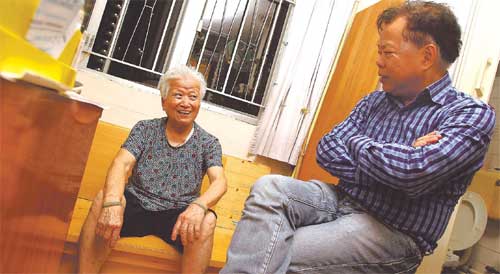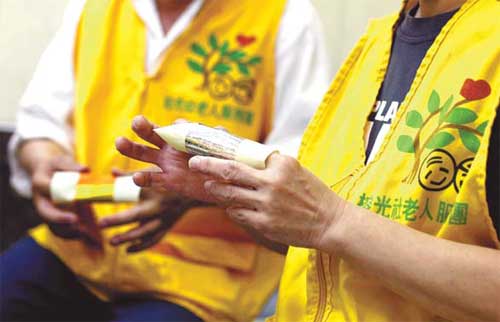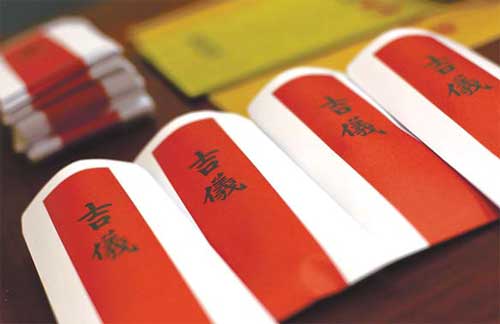Society
Bid to make the way to heaven smooth
By Ming Yeung (China Daily)
Updated: 2010-10-15 08:26
 |
Large Medium Small |
The photograph on top of the altar at the Diamond Hill memorial hall was of a lonely pensioner surnamed Siu.
His funeral had been a simple and silent affair. No religious rituals were performed, no relatives and friends were sobbing in the aisles, and no eulogy was read.
 Law Ying, 81, shares a joke with Peter Nip Yeung-shing, chairman of the Banyan Elderly Services Association in Hong Kong. Law is one of hundreds of residents in the city who have been getting help from the nonprofi t group, which assists single and widowed elderly people to prepare for their final stages of their lives, including organizing their funerals. [Photo/China Daily] |
The only mourners who arrived to bow and burn incense, before the casket was taken away for cremation, were five people who had never actually met Siu - all of them volunteers from the Banyan Elderly Services Association (BESA), a nonprofit group that helps single or widowed elderly people in Hong Kong.
In southern parts of China, the banyan tree, with its large, glossy green leaves, is a symbol of long life. It was chosen by the group as part of the organization's name as the tree complements its mission to provide protection for elderly people, shading them from the problems they face in the final stages of their lives.
Chinese people traditionally do not like to think about death, let alone plan for it. Yet for those with no family, one of the greatest fears is dying alone, with no one to take care of the funeral arrangements.
That is where the BESA comes in. Since launching the Friends of Sunset project in 2007, it has been helping lonely pensioners "pass with dignity".
With six core members, known as "pre-need caretakers", the group handles everything from identifying the body to organizing the funeral to the client's specifications, which are agreed by contract.
Other social welfare organizations in Hong Kong also provide similar services, with most performed by licensed undertakers. What distinguishes the BESA, says its chairman Peter Nip Yeung-shing, is the quality of care.
  |
"We're more like the client's family," Nip told China Daily, explaining that his staff members make regular visits to the columbarium and cemeteries to pay their respects.
It takes seven working days for his volunteers to take over the "after-death process", which begins with a call from the police or hospital, followed by a visit to the mortuary and then Diamond Hill to set a date for the funeral and cremation.
Volunteers also apply for a death certificate from the Births and Deaths General Register Office in Wan Chai.
"Once all the bookings are made, our staff members start arranging the funeral based on the requests of the deceased," said Nip. "Volunteers will gather to pay their final respects on the night of the funeral, with the body cremated the next day."
Handle with care
As the service provided is a sensitive and often difficult one, the BESA chooses its volunteers carefully to ensure they suit the job.
"Some people just can't deal with corpses," said vice-chairman Susan Lam Kwai-ha. "We don't take on every person who comes to us requesting to be a pre-need caretaker. We need to access their psychological status.
"If the volunteer is not emotionally stable and mature enough, dealing with the death of someone, whom he may have known for a while, may have an adverse impact on him."
One of the misconceptions about the service offered by the BESA is that it is like a coroner, which performs post-mortem examinations, she said, explaining: "We don't pick up bodies, we just identify them".
In Lam's opinion, death is the final destination on life's journey. "If people accept it as something natural, they will not focus on the sadness," she said. "We intend to let the elderly die peacefully, not regrettably."
Lam has had 15 years to train herself to be a "professional and rational" pre-need caretaker, a duty she first performed when a friend asked her to arrange a funeral of an elderly man who died in a car accident.
If a client receives a social security allowance from the Hong Kong government, the costs of their BESA-organized funeral - on average about HK$11,100 ($1,400) - will come out of the public purse. If not, bill is paid with money from an affiliated charitable fund.
However, Nip said the burial grant of about HK$10,000 provided by the city's social welfare department usually fails to cover all the necessary funeral expenses.